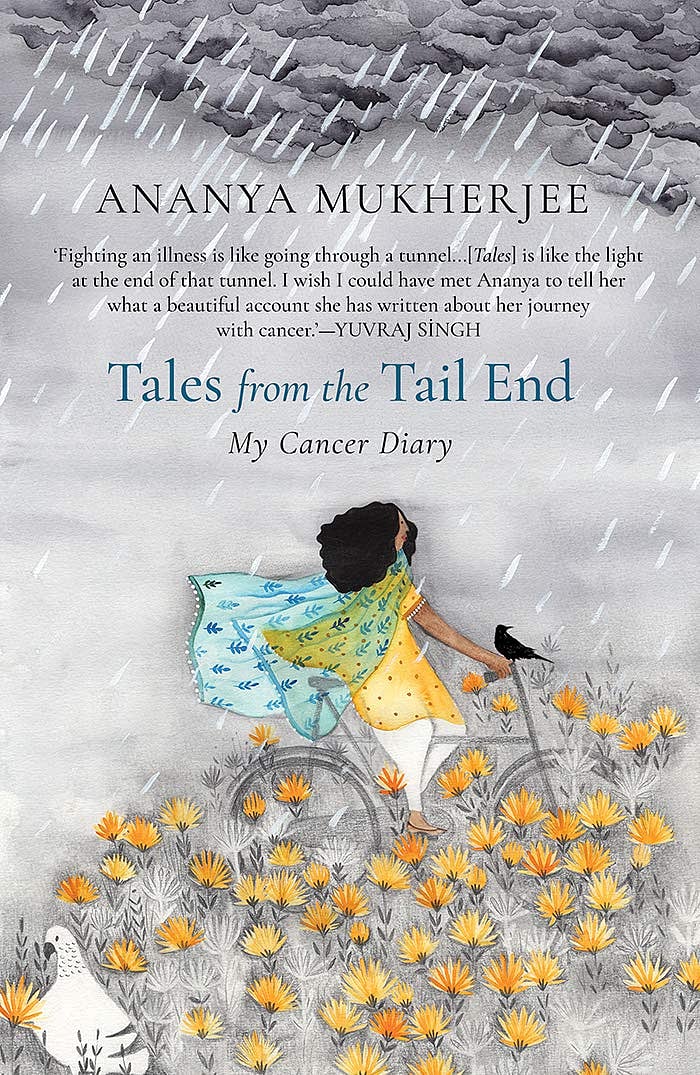Light in the Dark

In one of the later chapters in Tales from the Tail End, Ananya Mukherjee talks about Delhi, her hometown as tenderly and lovingly as many of its own residents do—in a tone that is sharp, yet which often chokes up, while talking of home. Even yellowing flats and a boorish, grey landscape cannot wrest away the larger-than-life persona of this city that exerts an irresistible pull over one and all. How fitting, then, that these terms could be used to describe Ananya herself, bursting forth with inner radiance and acerbic wit out of every page of this delightful, heartbreaking memoir.
Tales from the Tail End is a chronicle written by Mukherjee during her fight against breast cancer. Mukherjee, sadly, passed away in November 2018, and we are given a window into her mind’s rich playground through these stories.
Each story delves into some episodes or ruminations from the period of her cancer treatment, but cancer itself, the elephant in the room, is relegated to mere observations. So we have chapter after chapter detailing thoughts, anecdotes and dreams (Venetian gondola rides, no less) teeming with wisdom and cattiness—but barely any space is given to the illness that threatens to snatch away all. This is Mukherjee’s assertion: cancer does not get to be of significance in her life.
Imran Khan: Pakistan’s Prisoner
27 Feb 2026 - Vol 04 | Issue 60
The descent and despair of Imran Khan
Many important ideas and questions come forth from these pages: how women, who juggle numerous roles responsibly, make better leaders; how the Reuters article declaring India as the most dangerous country for women stood out starkly in her life; how survivors of life-threatening illnesses are often reduced to inspirational stories and depressing ‘survivors’ clubs’. These are the words of someone who has discovered a truly rare gift — that of profound faith. When faith isn’t blinded or limiting to the mind’s eye, it becomes truly transformational — a veritable love song to the world. Mukherjee believes in herself, her relationships, her love and her ideas — and this faith gives her vitality and strength.
The language of the book is pleasant and buoyant, much like the writer herself. Particular scenes like her father bent over sudoku puzzles while wearing a ‘pleasant frown’ evoke fond images from our own lives.
Mukherjee’s musings also focus on love. She talks about how her friends, family and well-wishers were a source of immense support and unconditional love for her — but mourns the world that moves ahead without her. People mill around initially, in all solicitousness; the numbers dwindle soon, and she is relegated to the occasional attention that the chronically ill are afforded. However, Mukherjee does not lapse into bitterness over this, but turns to poetry — like we all must, at some point in our lives. She turns to love.
A quote by Stephen Hawking mirrors Mukherjee’s thoughts about love perfectly:
“It would not be much of a universe if it wasn’t home to the people you love.”
How wondrous that two people living in dissimilar worlds, leading different lives, would think parallelly across time. It speaks of the universality of human love, pain and elation: our lives may be incredibly unique, but we all feel much the same things. We are never alone in our heartache, loneliness and unmitigated joy, and it is truths like these that an illness, however devastating, can bring to life. Tales from the Tail End stands as a testament for the same.
At the end, however, the fact that we are reading this after her death has a sobering effect on the overall joie-de-vivre of the entire book. Mukherjee’s husband ends the book with the story about how the two met, and what impact she had on his life. It is an exercise in joy and grief to read Tales from the Tail End, and it may leave one thinking about how ephemeral our lives are, like fireflies in the night sky.

